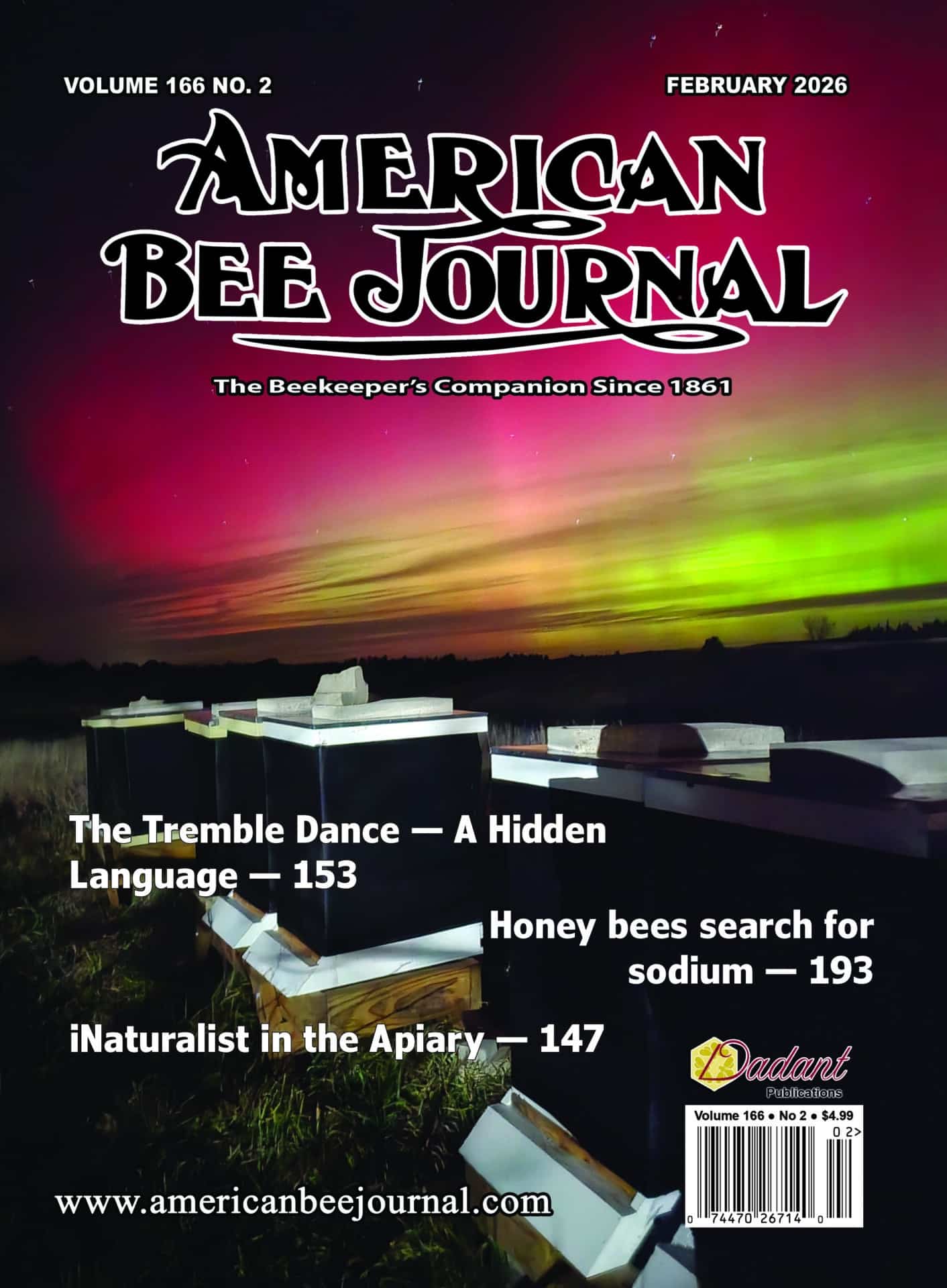The Classroom
The Classroom – February 2026

Colony assessment and assistance
I am finishing up my third year as a beekeeper and at age 84 I do not feel like I can count on another 20 or so years to acquire practical experience to become a veteran beekeeper. With that in mind, I have sought to gain “experience” through searching the internet and beekeeping journals and books for relevant information. My main problem is assessing the condition of my hives so that I can be proactive in dealing with any problems or issues I encounter.
I found an article published in American Bee Journal dated December 1, 2015 by Larry Connor titled “Beekeeping by the Numbers.” Using the formulas I found in the article, I developed an Excel spreadsheet so that I can get a visual assessment of what is going on in my hives. It probably could use some refinement but I think it has provided me with good information for the 2025 beekeeping season. For instance, I was alerted to the fact that I needed a new queen in my Green Langstroth [colony] when [the queen’s] daily egg-laying count dropped below 300. I included my “capped brood chart” with this note but I also have an “eggs per day” chart as well as a “pounds of honey stored” chart. The “honey stored” chart alerted me to the fact that my bees likely will not survive winter without copious feeding because four of the five [colonies] have less than 30 lbs. [13.6 kg] of honey stashed away.
All of that as a preface to this question: Are you aware of and does the beekeeping public have access to an assessment system that might be a tad more accurate or provide other critical information useful to a novice beekeeper?
Jim Smith
Georgia, November
A
Before I answer your question, I want to comment on the Excel file you created using Dr. Conner’s article. What a nifty idea! Using Excel is a terrific way to keep track of colony strength, health, and performance. I looked at the graph of capped brood that you provided. You did a wonderful job mapping this throughout the year. I see what you mean about the queen’s performance in the Green Langstroth hive. I like the fact that you are using actual data, rather than supposition, to make decisions regarding your colonies’ management needs.
To answer your question: There are software management tools available for beekeepers. Some are designed for you to input data you collect. These data might include queen status, frames of bees, frames of brood, clinical signs of pests and pathogens, etc. Such tools are used for recordkeeping purposes. Other software tools accompany various sensing devices that you insert into the hives. These devices include humidity, temperature, sound, and weight sensors that provide real-time information to remote monitoring software. I cannot really speak to the pros and cons of each platform as I do not have personal experience with each one. However, I know beekeepers who have used several of these and they speak highly of them.
I found comparison charts of some of the hive-monitoring platforms online. I searched the phrase “list of honey bee colony assessment software tools” on Google to find reviews of each platform. The AI Overview that Google generated for this search phrase listed six hardware-based monitoring systems, six data-management and decision-support software programs, and other tools you might find useful. I suggest reaching out to a beekeeping community forum, asking what tools other beekeepers find useful, and then sitting back to see what helpful comments people post. To do this, you might use Reddit, Beesource, other sites like those, or your favorite beekeeping Facebook page.
I am sorry that I have no personal information to add. I really need to try some of the available platforms. I believe starting with an Excel file is certainly heading in the right direction. As a last note, you will need to pay to access some of the tools you find online. This payment might be a one-time access fee or, more commonly, a subscription fee that unlocks the platform’s most complete functionality.
Drones surviving winter
It is common knowledge that worker bees in the fall drive drones out of the hive in preparation for overwintering. But do some drones overwinter in the cluster and survive into the following spring/summer? If I were to requeen a colony in the fall, would all (or nearly all) the drones present the following year reflect the new queen’s genetics, or would there be a mixture of some older drones from the previous queen along with the progeny of the new queen (ignoring for the moment any visiting or feral drones from other colonies)?
David Lewis
Wyoming, November
A
There are online reports that drones live up to 90 days. I could not find that number in a research article. Instead, I found studies in which drone longevity tends to max out around 45-55 days. Furthermore, I found plenty of studies in which the authors investigated drone eviction from the nest, settling on the finding that almost all living drones are evicted from the hive when the temperature drops significantly.
Now, do drones ever get missed by workers during the eviction process? Sure. Can drones survive weeks, or maybe even a month or longer, into winter? Absolutely. I looked online and saw videos posted by beekeepers in northern climates showing drones flying out of/into hives during winter. However, all this is the exception rather than the rule. Upon review of the literature, most drones do not survive the eviction process and fewer still survive all winter. It is also possible that some colonies will produce some drones throughout winter. Yet, the most practical answer to your question is that the drones you see in your hives in early spring are from the new queen you added to the hive last fall rather than any drones that overwintered.
Bee taste and flavor avoidance
We are in the cut-flower business with a side of beekeeping, or perhaps it is the other way around. With the flowers come deer problems. I normally avoid anything with the word “systemic” in it, but a substance called denatonium is said to be so strongly bitter that nothing will eat [it] and if applied to the ground will be taken up by the plant and thus make its stems and leaves unpalatable. My obscure question is whether bees have enough of a sense of taste to avoid the flowers of a plant spiked with this denatonium.
Dan
December
A
I learn so much by writing this column. I had never heard of denatonium, or more commonly denatonium benzoate, before your question. I investigated this and found that it is among the world’s most bitter substances. It turns out that companies add this to assorted items we should not be consuming, just to keep us from accidentally consuming the items. For example, it is added to antifreeze to keep humans and animals from accidentally ingesting it. It sounds yucky.
I conducted a Google Scholar search for “denatonium honey bee” and did not find any articles where this compound was provided to honey bees. I did, however, find articles about research in which this compound was fed to a variety of insects (flies, wasps, praying mantises, etc.). In my quick perusal of the literature, it seems that the insects to which they exposed denatonium could detect this chemical at low concentrations. Honey bees do have a sense of taste, though not necessarily as good as the sense of taste of other insects. In fact, some authors, even von Frisch himself, suggested that bees cannot taste bitter substances.
I found a couple of manuscripts on this topic, and the authors acknowledge that honey bee ability to taste bitter substances remains a mystery. Sometimes (usually in lab-based tests), the bees were unable to taste bitter substances. Other times (in a field-based test), the bees would avoid foraging on sugar water that contained a bitter substance (though unfortunately, not denatonium). Thus, I cannot, with confidence, tell you if honey bees are able to perceive this compound and stay away from plant tissues that contain it …


